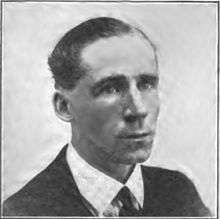Ernest Raymond

Ernest Raymond (1888–1974) was a British novelist, best known for his first novel, Tell England (1922), set in World War I. His next biggest success was We, The Accused (1935), generally thought to be a reworking of the Crippen case. He wrote over fifty novels. Raymond's autobiography was published in two volumes; the first, The Story of My Days, 1888–1922, was published in 1968; the second, Please You, Draw Near, 1922–1968, in 1969. He was appointed an OBE in 1972, and died in 1974.
Biography
Ernest Raymond was born in Argentières, France, the illegitimate son of an army officer. He lived with his abusive aunt as a child. Her sister, his undisclosed mother, lived nearby with her family.[1]
Raymond was educated at St Paul's and at Chichester Theological College. He was ordained in the Anglican Church in 1914 and served on six fronts in the First World War. He resigned Holy Orders in 1923. He wrote many books, including the novels Damascus Gate (1923), A Chorus Ending (1951), The City and the Dream (1958, which concluded his London Gallery series of novels portraying London life in the first half of the twentieth century), Mr Olim (1961), and The Bethany Road (1967). Other titles include Two Gentlemen of Rome: the Story of Keats and Shelley (1952), and Paris, City of Enchantment (1961).[2] Many of his 1930s–1940s novels included clerics, the characters' religious life, and spiritual philosophy. The Autobiography of David (1946) was "as told to" him by the pseudonymous "David" who was an agoraphobiac as well as a convicted sexual exhibitionist who had spent time in a prison institution for the mentally ill.
George Orwell in 1945 praised Raymond as a "natural novelist" who could portray convincingly the lives of ordinary people. In particular he praised We, the Accused for its emotional power, while criticising the clumsy and long-winded way it is written.[3] We, the Accused was made into a well-received TV drama starring Ian Holm, Angela Down and Elizabeth Spriggs in 1980.[4]
Raymond was married twice and had three children.[1]
Bibliography
- Tell England: A Study in a Generation (1922)
- Rossenal (1922)
- Damascus Gate (1923)
- The Shout of the King (1924)
- Wanderlight (1924)
- The Fulfilment of Daphne Bruno (1926)
- Morris in the Dance (1927)
- The Old Tree Blossomed (1928)
- Through Literature to Life; An Enthusiasm and an Anthology (1928)
- A Family That Was (1930)
- The Jesting Army (1931)
- Mary Leith (1932)
- Child of Norman's End (1934)
- We, the Accused (1935)
- Don John's Mountain Home (1936)
- The Marsh (1937)
- In the Steps of St. Francis (1939)
- The Miracle of Brean (1939)
- A Song of the Tide (1940)
- The Last to Rest (1941)
- Was there Love Once (1942)
- The Corporal of the Guard (1944)
- For Them That Trespass (1944)
- Back to Humanity (1945)
- The Autobiography of David (1946)
- Five Sons of Le Faber (1946)
- Kilburn Tale (1947)
- In the Steps of the Brontes (1948)
- Gentle Greaves (1949)
- Witness of Canon Welcome (1950)
- A Chorus Ending (1951)
- Chalice and the Sword (1952)
- Two Gentlemen of Rome: The Story of Keats And Shelley (1952)
- The Bronte Legend: Its Cause And Treatment (1953)
- The Nameless Places (1954)
- To the Wood No More (1954)
- Lord of Wensley (1956)
- The Old June Weather (1957)
- The City and the Dream (1958)
- The Quiet Shore (1958)
- The Visit of Brother Ives (1960)
- Mr Olim (1961)
- Paris, City of Enchantment (1961)
- The Chatelaine (1962)
- One of Our Brethren (1963)
- Late in the Day (1964)
- Tree of Heaven (1965)
- The Mountain Farm (1966)
- Bethany Road (1967)
- A Song of the Tide (1967)
- The Story of My Days: An Autobiography 1888–1922 (1968)
- Please You, Draw Near: Autobiography 1922–1968 (1969)
- Gentle Greaves (1970)
- Good Morning, Good People: an autobiography – past and present (1970)
- A Georgian Love Story (1971)
- Our Late Member (1972)
- Miryam's Guest House (1973)
- Under Wedgery Down (1974)
References
- 1 2 Drewey Wayne Gunn (2014) Gay Novels of Britain, Ireland and the Commonwealth, 1881–1981, McFarland & Co., Jefferson, North Carolina ISBN 978-1-47661-841-8
- ↑ Alfred Charles Ward; Maurice Hussey (1981) Longman Companion to Twentieth Century Literature, Second Edition, p.442 ISBN 978-0-58235-307-7
- ↑ "Good Bad Books" (2 November 1945) Tribune
- ↑ We, the Accused on IMDb